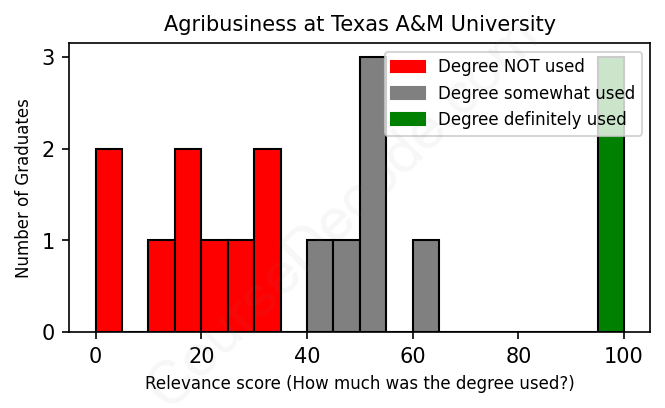
First, some facts. Of the Agribusiness graduates from Texas A&M University we've analyzed , here's how many have used (or NOT used) their degree in their career:

These are estimates based on AI analysis of 18 LinkedIn profiles (see below).
The verdict? Bad. Overall, with an average relevance score of 41%, Agribusiness graduates from Texas A&M University have a substantially lower likelihood (-26%) of finding work in this field compared to the average graduate across all fields:
And for comparison, here's the chart for all profiles we've looked at across all degrees.
Also, after graduating, only 22% of these graduates have pursued further education other than another Bachelor's degree (such as a Masters degree or other), compared to the average across all profiles of 35%. This suggests a Bachelors degree is enough for most Agribusiness graduates, and it's normal to look for work straight after graduation.
See the details:
|
Relevance score: 100% We think this person has gone into a career highly relevant to their degree. We think this person has gone into a career highly relevant to their degree.
DEGREE INFOGraduated in 2019 from Texas A&M University with a Bachelor's degree in Agribusiness. Also pursued further education since (see below). JOB HISTORY SINCE GRADUATIONAgricultural Appraiser Intern WT Appraisal May 2019 - Aug 2020 FURTHER DEGREES DONE SINCE GRADUATINGMaster'sTexas A&M University 2019 - 2020 ABOUTMy ability to manage and create programs has been the spotlight of my work experience. I have been able to work with people and cultures across the world in international conferences, speaking series, and appraising. I strive to build and maintain relationships while working to develop new projects or programs. I enjoy coordinating events and working on challenging projects that require out-of-the-box thinking and collaboration. I do well working in flexible and energetic environments that allows me to continue learning and growing. In my roles as teaching assistant and communications manager, I have been able to improve my communication and public relations skills. I am passionate about advocating for the agricultural industry specifically with increasing consumer knowledge and improving agricultural policy. My top priorities include my faith, family, and career and I strive to always improve in each of those areas. Through my work with data analysis, event management, and program development I have experienced professional and personal growth. It is imperative that I am in an environment that I can continue to learn and grow! |
The top 10 most common jobs done by the graduates we've analyzed (ranked most common to least) are:
When looking at the LinkedIn profiles of graduates from Texas A&M University with a degree in Agribusiness, it seems that many of them have ventured into various roles that aren't always directly related to their field of study. The most common job types include positions in accounting, sales, management, and customer service, but many of these roles lack direct application of agribusiness principles. For instance, several graduates found themselves in roles like Staff Accountant or Sales Account Representative, where their responsibilities primarily involved financial or sales operations without a significant focus on agricultural practices or business management specific to agriculture.
However, there are some exceptions, especially among those working in agricultural or food-related companies, such as positions at MWI Animal Health and H-E-B, which utilize agribusiness knowledge and skills effectively. Unfortunately, the trend indicates a general divergence from positions that directly relate to agribusiness, with many graduates taking on roles that lean more towards general business functions, management, or even completely unrelated fields like law or healthcare administration. Overall, while some graduates have landed relevant positions, a significant portion seem to be working in roles that don't fully leverage the specialized skills gained from their Agribusiness degrees.
Here is a visual representation of the most common words in job titles for Agribusiness graduates (this is across all Agribusiness graduates we've analyzed, not just those who went to Texas A&M University):

So, looking at the career paths of graduates from the Agribusiness program at Texas A&M, it seems like they’ve had a pretty mixed bag of outcomes. Right out of college, many graduates started in roles that aren’t necessarily tied to agriculture or agribusiness specifically. For example, some went into accounting, financial services, or even customer support roles. This might indicate that while they have a degree in agribusiness, a lot of these students are finding jobs in broader fields, perhaps because they feel like they need to get work experience under their belt first or just because of the job market at the time.
Fast forward a few years, and it looks like there is some improvement in specialization and content relevance. Some alumni have moved into roles more aligned with their agribusiness education, such as sales and management positions within ag-related companies. Others continue to work in more general roles, like in sales or as branch managers in different sectors. Overall, it appears that while initial jobs may stray from agriculture, with time, graduates find more relevant opportunities. But it’s clear that not all graduates are landing great positions directly related to agribusiness, and some are even working in industries that have little to do with what they studied. So, there's a good chance some alumni are navigating their careers toward their degree's field, but it definitely isn’t a straight path for everyone.
Okay, so getting a Bachelor's degree in Agribusiness at Texas A&M isn't a walk in the park, but it's also not the hardest thing out there either. It’s a mix of business principles and agriculture, which can be super interesting if you like both fields. Some people find the coursework to be a bit challenging, especially with the math and economics parts, but if you stay on top of your studies and manage your time well, you can definitely handle it. Overall, it's about average in difficulty compared to other degrees—you’ll need to put in the effort, but it’s totally doable if you’re passionate about it!
Most commonly, in the LinkedIn profiles we've looked at, it takes people 4 years to finish a Bachelor degree in Agribusiness.
Looking at the job trajectories of these Texas A&M Agribusiness graduates, it seems like there’s a pretty mixed bag when it comes to how much they’re making. Some of them started off with solid positions, like those in sales and management, which usually pay decent salaries, especially as they advanced in their careers. For instance, the graduate who went from a Management Trainee to Branch Manager at Murphy-Hoffman clearly moved up the ladder in a good-paying field. However, others had more roundabout paths, like the one who went from a housekeeper to various roles that may not offer big bucks. Overall, while some are likely pulling in good salaries now—especially those in management and sales roles—not all of them have had straight paths to financial success. It’s a bit of a mixed review, but with the right choices and experience, many of them are on the right track to decent earnings.
Here is a visual representation of the most common words seen in the "about" section of LinkedIn profiles who have a Bachelor degree in Agribusiness (this is across all Agribusiness graduates we've analyzed, not just those who went to Texas A&M University). This may or may not be useful:

Here are all colleges offering a Bachelor degree in Agribusiness (ordered by the average relevance score of their Agribusiness graduates, best to worst) where we have analyzed at least 10 of their graduates:
| College | Score | Count |
|---|---|---|
 Texas A&M University Texas A&M University
|
41 | 18 |